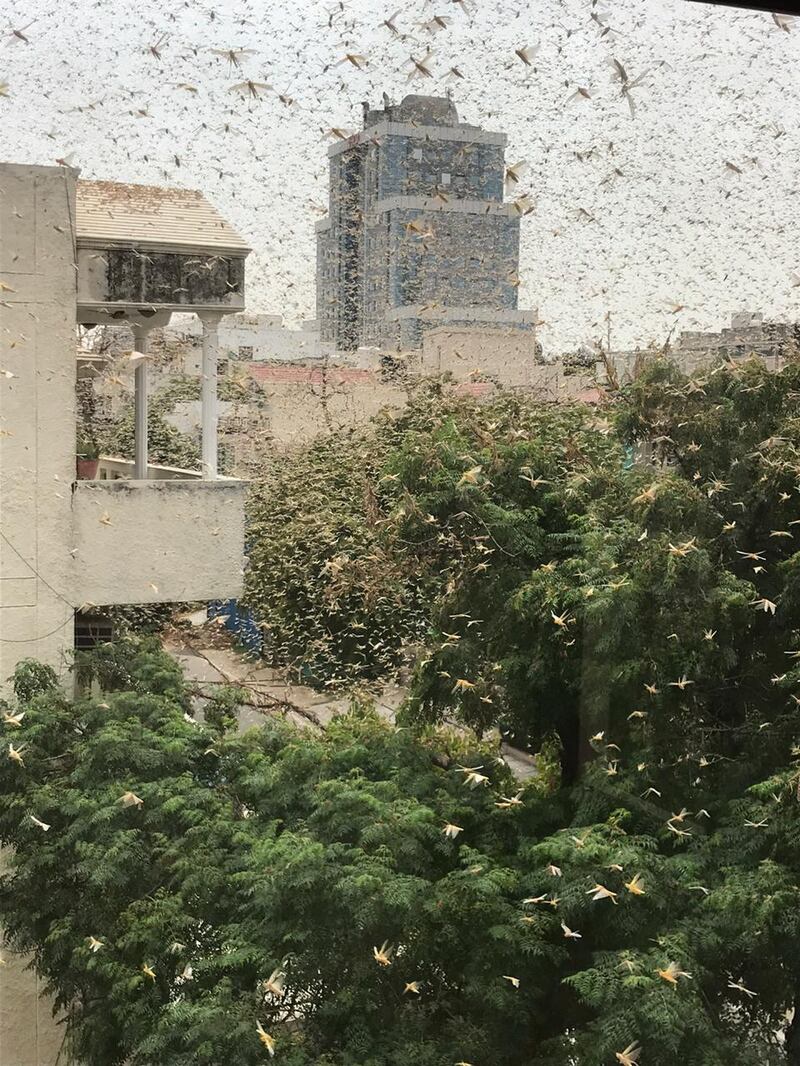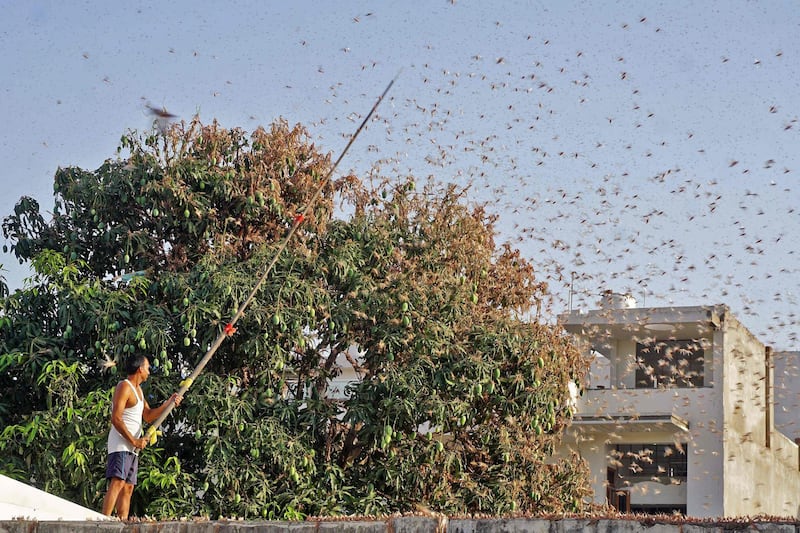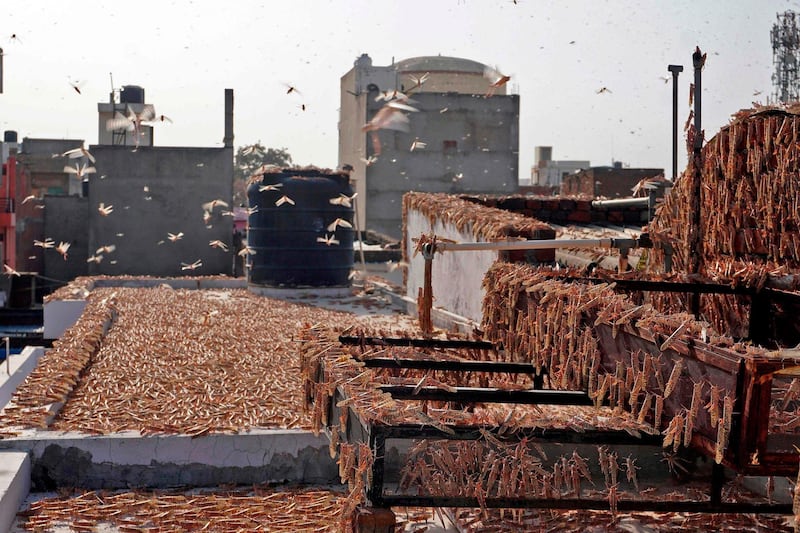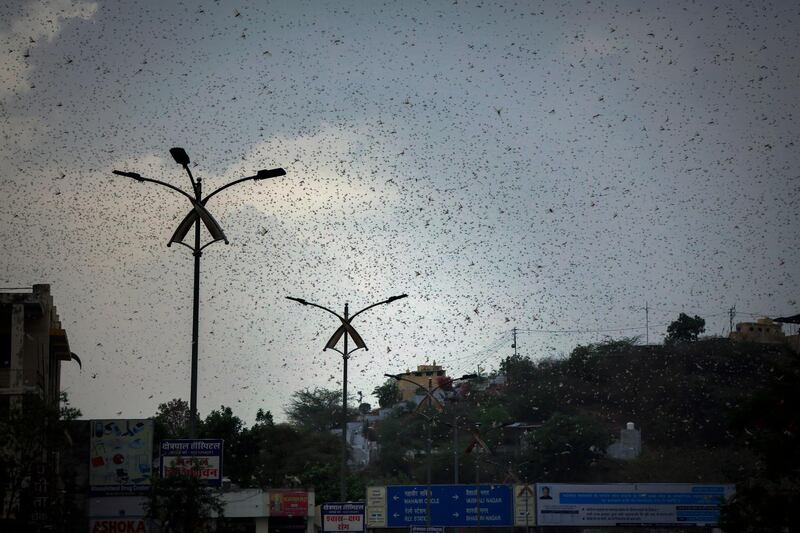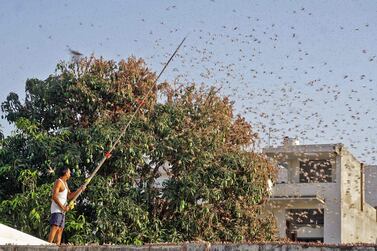Panic gripped parts of Delhi and cities around India's capital as large swarms from the country's worst locust invasion for decades descended on the area.
Delhi authorities put the city on a high alert after two bustling satellite cities were taken over on Saturday by desert locusts that have rampaged through towns and villages across large swathes of the country.
Videos posted on social media by residents of Gurgaon and Faridabad showed millions of the insects hovering over buildings. The locusts entered southern parts of Delhi near the international airport, prompting an air safety warning to pilots. Strong winds then forced the swarm northward but there are fears that a change of wind direction could bring the insects back to the capital.
Officials said this was the first locust invasion in the region in nearly four decades and warned of another swarm descending on Sunday in Noida, a Delhi satellite city that, like Gurgaon and Faridabad, was agricultural land a few decades ago. Locusts were seen on the outskirts of Noida on Sunday afternoon but they had not entered the city.
दिल्ली में टिड्डियों के हमले की आशंका को मद्देनजर रखते हुए कृषि विभाग, दिल्ली सरकार ने एडवाइजरी जारी की। https://t.co/Lf7PK5iXeW pic.twitter.com/Mdr5vPGMYw
— Gopal Rai (@AapKaGopalRai) June 27, 2020
The Delhi regional government asked people to keep doors and windows closed, cover outdoor plants with plastic sheets and “distract the locusts by making high-decibel sound through beating utensils and playing high-volume music on music systems/ DJs and firing crackers”.
Officials had also been asked to be on standby to start spraying insecticides, according to an order shared on Twitter by Gopal Rai, the Delhi minister for environment.
Residents of Gurgaon, home to several multinational companies, clanged kitchenware and played loud music to drive off the locusts as many on social media described the scene as “Swarmageddon”.
Anirudh Garg, a 20-year-old mechanical engineering student, said he was shocked at another “plague” hitting Delhi, which is one of the main centres of infection in India's surging coronavirus outbreak.
#locustattack in Gurgaon
— Anirudh Garg (@anirudhgarg_) June 27, 2020
Will Anything be left for 2021 ?#Locust Heading towards #Delhi#LocustsAttack pic.twitter.com/XlgWZcXLjo
"I was watching a web series when I suddenly saw a large number of locusts were damaging our plants. My father said the last such attack of the insects happened decades ago," Mr Garg told The National.
K L Gurjar, deputy director at India’s Locust Warning Organisation, said three large swarms were active in the national capital region.
He said the insects tended to move on quickly from urban areas as they cannot enough food to survive.
"The winds and lack of vegetation helped to push them out of Delhi," Mr Gurjar told The National.
The crop-destroying insects arrived in India from East Africa via Pakistan in April. Most of the invasions have occurred in Rajasthan, Uttar Pradesh and Madhya Pradesh states, where an estimated 50,000 hectares of farmland have been destroyed by the pests.
Locusts can fly up to 150 kilometres a day, and a square-kilometre swarm consists of up to 80 million adults that can devour enough food for 35,000 people in a single day, according to the UN Food and Agriculture Organisation.
Faridabad resident Nikita Chaudhary was preparing her breakfast when she heard her mother-in-law calling frantically from the balcony after seeing a roaring blizzard of locusts shrouding the morning skies.
The 31-year-old textile designer was stunned by the sheer numbers as hundreds of thousands of the insects hovered near their upscale residential society, making an ear-deafening buzz.
"The locusts had filled the skies, they were everywhere … they fell on trees, stuck to leaves and plants and even settled on the grass in the park outside, turning it completely brown," Ms Chaudhary told The National.
“It was a frightening sight that I have never witnessed before,” she said.
